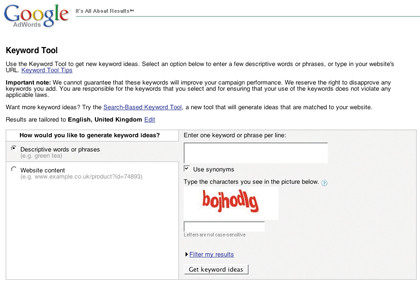How to optimise your site for Google Caffeine
Google Caffeine and SEO: what you need to know
Before you rush into making fundamental changes to your site remember that, as with any system update, there'll be a period of fixing glitches that weren't picked up during beta testing. So if you've done everything right and your website has dropped, don't panic, because chances are it will rise back up soon.

COVER ALL BASES: Remember, other search engines are available. For tips on optimising for Bing, see here
This doesn't mean that you shouldn't look to improve your site's SEO, of course. So let us guide you through a few top tips for optimising for Caffeine. The first thing you need to do is make your website faster …
1. Make more use of CSS
By making more use of CSS, you can lessen the amount of HTML you need to build your site. Make sure you link to an external CSS file for all your styles using this code:
2. Place your JavaScript in external files
Get daily insight, inspiration and deals in your inbox
Sign up for breaking news, reviews, opinion, top tech deals, and more.
Ensure your JavaScript code isn't within the HTML body, to speed up download times.
3. Minify JavaScript and CSS
Minification means removing unnecessary characters from code to reduce its size, thereby improving load times. All white space is removed (spaces, new lines and tabs) plus any comments. Two popular tools for minifying are JSMin and YUI Compressor.
4 Optimise your images
Google will look at the time it takes for your page's assets to load, so consider re-saving images so that the file size is as small as possible. Consider using GIFs for smaller graphics and JPEGs for bigger, more detailed images such as photos. Also try converting GIFs to PNGs to see if there are any savings.
5. Use Gzip compression
By compressing your content, you can reduce the download size of your page by up to 70 per cent. This makes your website faster when responding to requests. You can enable this in Apache web server by using mod_ gzip for Apache 1.3 or mod_deflate for Apache 2.x.
6. Get a faster server
If you're currently on shared hosting, there's a good chance that upgrading your package will have a positive impact on your search positions. If you can afford it, consider a dedicated server. But remember, if you're running a UK site, make sure that the server is also located in the UK. It's tempting to buy a cheaper one overseas, but this will have a negative impact.
Optimise content
The Caffeine update means Google is putting an even greater emphasis on good content, so:
1. Ensure your keywords are actually on your page.
2. Make good use of internal linking using your keywords, but don't overdo it.
3. Navigation links must be text and not images.
4. If you're using meta tags, make sure they relate to your content, are unique and importantly, not spammy. Keep meta keywords at around 35 words, and meta descriptions no more than 25 (to prevent the dreaded '...'s in search results snippets).
5. Create a sitemap page. This will help Google crawl your website naturally.
Off-site SEO
When building links, make sure they're as relevant as possible. Help Google identify what topic your website is about: we want quality and not necessarily quantity.

KEYWORDING: Try using Google's Keyword Tool to pinpoint important words and phrases
Think of Google's index as a big semantic network and how your site sits in this. You can't create all the links you need yourself – and if you do it's likely to look very unnatural. Instead, think about how you can encourage people to link back to you. Maybe provide some free resources, or contribute noteworthy news on your industry.
Either way, try to promote some sort of community that will talk about your subject and refer back to your site.